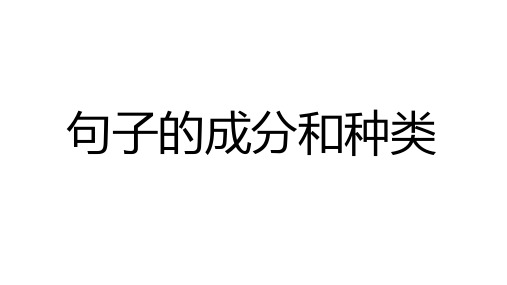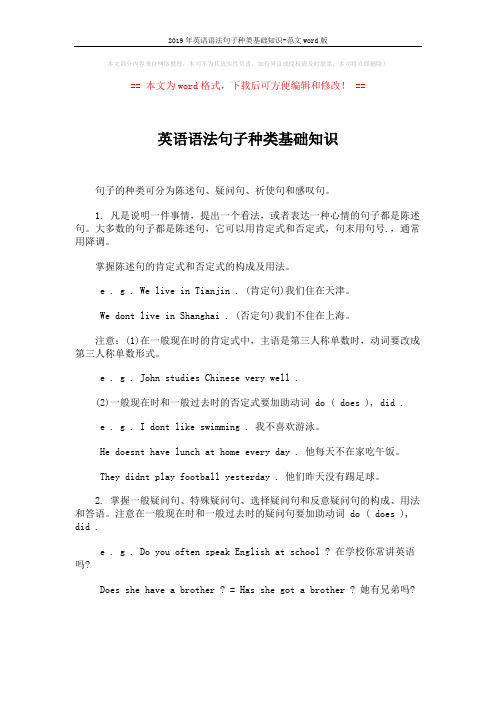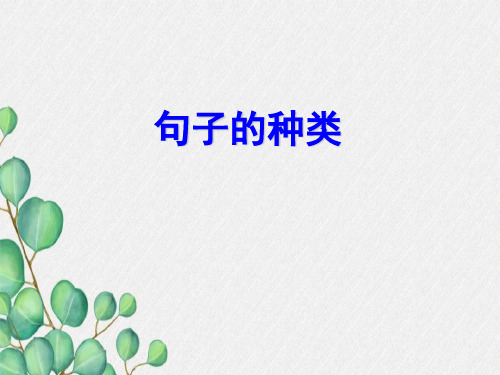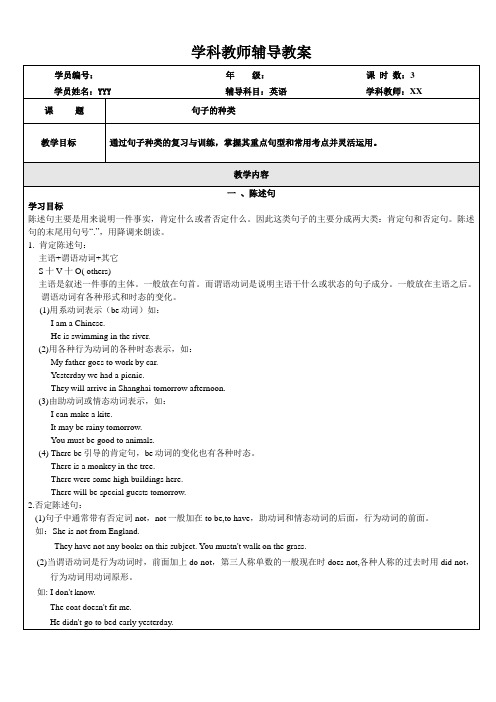小学英语语法----句子的种类
英语语法-句子的种类

高中英语语法组成句子的各个部分叫句子成分。
英语句子成分有主语,谓语,表语,宾语,宾语补足语,定语,状语等。
顺序一般是主语,谓语,宾语,宾语补足语,而表语,定语,状语的位置要根据情况而定。
1、主语主语表示句子主要说明的人或事物,一般由名词,代词,数词,不定式等充当。
Helikeswatch'ingTV.他喜欢看电视。
2、谓语谓语说明主语的动作,状态或特征。
1),简单谓语由动词(或短语动词)构成。
可以有不同的时态,语态和语气。
Westud'yforthepeo'ple.我们为人民学习。
2),复合谓语:情态动词+不定式Icanspeakalit'tleEng'lish.我可以说一点英语。
3、表语表语是谓语的一部分,它位于系动词如be之后,说明主语身份,特征,属性或状态。
一般由名词,代词,形容词,副词,不定式,介词短语等充当。
Mysis'terisanurse.我姐姐是护士。
4、宾语宾语表示动作行为的对象,跟在及物动词之后,能作宾语的有名词,代词,数词,动词不定式等。
WelikeEng'lish.我们喜欢英语。
有些及物动词可以带两个宾语,往往一个指人,一个指物,指人的叫间接宾语,指物的叫直接宾语。
Hegavemesom'eink.他给了我一点墨水。
有些及物动词的宾语后面还需要有一个补足语,意思才完整,宾语和它的补足语构成复合宾语。
如:Wemakehimourmon'itor.我们选他当班长。
5、定语在句中修饰名词或代词的成分叫定语。
用作定语的主要是形容词,代词,数词,名词,副词,动词不定式,介词短语等。
形容词,代词,数词,名词等作定语时,通常放在被修饰的词前面。
Heisanewstu'dent.他是个新生。
但副词,动词不定式,介词短语等作定语时,则放在被修饰的词之后。
Thebikeintheroomismine.房间里的自行车是我的。
英语语法6之句子的成分和种类

(九)独立成分
与句中其它成分没有语法上的关系的词、短语或固定词组成为独立成分。
独立成分在句中用逗号跟其它成分隔开,它不能脱离句子而独立存在。根据其 表示的意义可分为三种: 1.感叹句—表示说话人的某种感情,长置于句首,有时也可放在句中或句末。 举例:Why,I’ve never seen anything like it. 2.呼语—直接称呼人的用语,用句首、句中或句末,以引起说话人的对方注意。 常用表示人的专有名词表示,也可用普通名词、代词、短语表示。 举例:Quick,boy,go for the tent! 3.插入语—即插入句中的词语或句子,表示说话人对说话内容的看法,态度或 附加的解释,位于句首、句中或句末。通常由副词(短语)、介词短语、不定 式短语,现在分词短语或分句表示。 举例:Most of them,sadly,we never discover. ①有时说完一句话后,如果想补充说明或解释上文,可用破折号引出插入语: 举例:Don't hurry—there is plenty of time.
(三)表语
和系动词一起构成谓语,是名词性复合谓 语的一部分。表示主语的身份、特征或状态, 位于系动词之后。可用作表语的由名词、形容 词、代词、数词、副词、分词、不定式、动名 词、介词短语、从句等。 举例:Genius is one percent inspiration and ninety-nine percent perspiration.
To live is to function. A man without a wife is half a man.
(二)谓语
表示主语的动作或状态,即说明主语“做什么”,“是什么” 或者“处于什么状态”。谓语通常放在主语之后。分为 1.简单谓语—由一个动词或短语动词表示,具有不同的时态、 语态或语气。 举例:Roring waves climb the distant rock.
2019年英语语法句子种类基础知识-范文word版 (1页)

2019年英语语法句子种类基础知识-范文word版本文部分内容来自网络整理,本司不为其真实性负责,如有异议或侵权请及时联系,本司将立即删除!== 本文为word格式,下载后可方便编辑和修改! ==英语语法句子种类基础知识句子的种类可分为陈述句、疑问句、祈使句和感叹句。
1. 凡是说明一件事情,提出一个看法,或者表达一种心情的句子都是陈述句。
大多数的句子都是陈述句,它可以用肯定式和否定式,句末用句号.,通常用降调。
掌握陈述句的肯定式和否定式的构成及用法。
e . g . We live in Tianjin . (肯定句)我们住在天津。
We dont live in Shanghai . (否定句)我们不住在上海。
注意:(1)在一般现在时的肯定式中,主语是第三人称单数时,动词要改成第三人称单数形式。
e . g . John studies Chinese very well .(2)一般现在时和一般过去时的否定式要加助动词 do ( does ), did .e . g . I dont like swimming . 我不喜欢游泳。
He doesnt have lunch at home every day . 他每天不在家吃午饭。
They didnt play football yesterday . 他们昨天没有踢足球。
2. 掌握一般疑问句、特殊疑问句、选择疑问句和反意疑问句的构成、用法和答语。
注意在一般现在时和一般过去时的疑问句要加助动词 do ( does ), did .e . g . Do you often speak English at school ? 在学校你常讲英语吗?Does she have a brother ? = Has she got a brother ? 她有兄弟吗?。
英语语法-句子的种类(史上最详细)

(4) 现在完成时和过去完成时的一般疑问句。 将助动词 have/has /had提至句首。 You have known her since your childhood? Have you known her since your childhood? 你从童年时就认识她吗? Yes I have /No I haven’t He had learned English before he came here? Had he learned English before he came here? 他来这之前就学过英语吗? Yes he had / No he hadn’t.
2.感叹句的种类
感叹句一般用what 或how开头,其具体用法如下:
(1) what引导的感叹句 (中心词是名词)
①What +a/an+ 形容词+可数名词单数(+主语+谓语)!
What a cold day (it is) !
多么冷的一天啊!
What a clever boy (he is)! 多么聪明的男孩!
句子的种类
英语的句子按照用途可分为四类:陈述句、疑问句、祈使 句和感叹句。
(一)陈述句
用来陈述一件事实或表达说话者看法的句子叫作陈述句, 句末用句号表示句子的陈述结束。陈述句分为肯定句和否 定句。 I like apples. 我喜欢苹果。 Tom is not good at English. 汤姆英语学得不好。
(2) 情态动词的一般疑问句。 陈述句中有情态动词,直接将情态动词提至主语前。 You can bring me some bread. Can you bring me some bread? Yes I can / No I can’t I must do it now. Must I do it now? Yes you must / No you need not.
小学英语语法归纳总结目录

小学英语语法归纳总结目录一、基本句型1.1 主谓结构1.1.1 陈述句1.1.2 否定句1.1.3 疑问句1.2 主谓宾结构1.2.1 简单宾语1.2.2 双宾语1.2.3 宾补1.3 主谓表结构1.3.1 表语1.3.2 宾语补足语1.3.3 含有动词的表语1.4 并列句1.5 状语从句二、名词2.1 可数名词与不可数名词 2.1.1 单数可数名词2.1.2 复数可数名词2.1.3 不可数名词2.2 名词所有格2.2.1 单数名词所有格2.2.2 复数名词所有格2.2.3 不规则名词所有格 2.3 特殊名词2.3.1 复合名词2.3.2 集体名词2.3.3 专有名词三、代词3.1 人称代词3.1.1 主格形式3.1.2 宾格形式3.1.3 形容词性物主代词3.1.4 名词性物主代词3.2 反身代词3.3 指示代词3.3.1 人称指示代词3.3.2 物品指示代词3.3.3 时间指示代词3.4 疑问代词3.4.1 主格疑问代词3.4.2 宾格疑问代词3.4.3 形容词性疑问代词3.4.4 名词性疑问代词四、动词4.1 一般现在时4.1.1 肯定句4.1.2 否定句4.1.3 疑问句4.1.4 特殊疑问词的一般现在时4.1.5 现在进行时4.2 一般过去时……五、形容词与副词5.1 形容词的基本用法5.1.1 修饰名词5.1.2 修饰代词5.2 形容词的比较级和最高级 5.2.1 比较级的基本结构5.2.2 最高级的基本结构5.2.3 不规则比较级和最高级 5.3 副词的基本用法5.3.1 修饰动词5.3.2 修饰形容词和副词5.4 副词的比较级和最高级六、冠词6.1 定冠词6.1.1 特指的事物6.1.2 唯一的事物6.2 不定冠词6.2.1 泛指一个6.2.2 泛指每一个七、介词7.1 英语中常见的介词7.2 常见介词短语7.2.1 在地点上7.2.2 在时间上7.2.3 在关系上八、连词8.1 并列连词8.1.1 连接两个并列的词语 8.1.2 连接两个并列的句子 8.2 从属连词8.2.1 时间从属连词8.2.2 原因从属连词8.2.3 条件从属连词8.2.4 目的从属连词九、感叹句9.1 后置感叹句9.2 前置感叹句十、简单句和复合句的转换10.1 从简单句到复合句10.2 从复合句到简单句这些是小学英语语法的归纳总结目录,希望对你有帮助。
小六英语 (16. 语法专项之-- 句子种类)

学科教师辅导教案学员编号:年级:课时数:3学员姓名:YYY辅导科目:英语学科教师:XX 课题句子的种类教学目标通过句子种类的复习与训练,掌握其重点句型和常用考点并灵活运用。
教学内容一、陈述句学习目标陈述句主要是用来说明一件事实,肯定什么或者否定什么。
因此这类句子的主要分成两大类:肯定句和否定句。
陈述句的末尾用句号“.”,用降调来朗读。
1. 肯定陈述句:主语+谓语动词+其它S十V十O( others)主语是叙述一件事的主体。
一般放在句首。
而谓语动词是说明主语干什么或状态的句子成分。
一般放在主语之后。
谓语动词有各种形式和时态的变化。
(1)用系动词表示(be动词)如:I am a Chinese.He is swimming in the river.(2)用各种行为动词的各种时态表示,如:My father goes to work by car.Yesterday we had a picnic.They will arrive in Shanghai tomorrow afternoon.(3)由助动词或情态动词表示,如:I can make a kite.It may be rainy tomorrow.You must be good to animals.(4) There be引导的肯定句,be动词的变化也有各种时态。
There is a monkey in the tree.There were some high buildings here.There will be special guests tomorrow.2.否定陈述句:(1)句子中通常带有否定词not,not一般加在to be,to have,助动词和情态动词的后面,行为动词的前面。
如:She is not from England.They have not any books on this subject. You mustn't walk on the grass.(2)当谓语动词是行为动词时,前面加上do not,第三人称单数的一般现在时does not,各种人称的过去时用did not,行为动词用动词原形。
英语语法中的9种句子成分

英语语法中的9种句子成分一.主语Subject“主语”中的“主”是主人、主导的意思。
(一)定义:主语是动作的发出者,通常为一个句子中第一个独立的名词【或名词性结构】。
也可以理解为主语就是句子中说明的人或事物【sb/sth】独立的:即不在短语中、不在从句中(二)句子中主句的4种形式:1.名词本身2.代词3.动词-ing/to do形式【注意:做状语的V-ing/to do 结构除外】4.主语从句【即主语是个句子,引导词that 不可省略】例句:The flower is beautiful.I love you.Teaching English is my job.To teach English today is my job.(补充:动词做主语的-ing形式称为动名词,to do形式称为不定式。
前者强调经常性、习惯性,后者强调阶段性、特定性、将来性。
)That she is still alive is a wonder.二.谓语Predicate(一)定义:谓语是主语发出的动作,通常为主语后的第一个独立的动词【或动词性结构】。
也可以说是用来说明主语的动作、状态和特征。
例句:He is singing.(其中的is是助动词,is singing 才是谓语)He likes singing.(likes是实意动词,所以谓语是likes)现在分词/过去分词前无助动词的不是谓语。
(三)非谓语动词有谓语动词,就有非谓语动词。
那么,什么是非谓语动词?非谓语动词即一个句子中,不是谓语的动词就是非谓语动词。
非谓语的三种形式:1.doing(表主动、进行)2.done动词过去式(表被动、完成)3.to do(表将来)例句:I saw a girl crying in a car.(crying表明女孩主动在哭并且是正在进行)Beaten by Bob,Tom was very sad.(beaten有两层含义,一是被别人打了,不是自己打的,是被动的。
英语语法-句子成分和句子类型

01
02
The End
Thank you for your attending!
单击此处添加小标题
03
As he was leaving the office, it started to rain.(时间状语从句)
单击此处添加小标题
02
The old man sat on the bench, enjoying the sun-set.(现在分词词组)
单击此处添加小标题
补语是用于补充说明主语或宾语的身份或特征。 补语一般由名词或形容词充当。 I am a teacher. (S C) Don’t leave me alone. (O C)
SVC
SVOo
SVO
SVOC
SVOC
判断下列各句句子的基本句型
判断下列各句句子的基本句型
The great poet lived in the 18th century. She introduced her friends to us. The tape-recorder is on the desk. The guests have just arrived. She laid the baby on the bed.
这两个基本句型的共同点是谓语动词均为及物动词。 SVO句型 I love you very much! SVOA句型 I put the bottle on the desk. SVO 句型与SVOA句型的区别在于A是否必须存在! 不能缺少! 可以省略!
基本句型四、五
基本句型六
这个基本句型的特点是谓语动词可以接复合宾语结构。 SVOC句型 I saw him rushing out of the room. OC可以看作复合宾语!
- 1、下载文档前请自行甄别文档内容的完整性,平台不提供额外的编辑、内容补充、找答案等附加服务。
- 2、"仅部分预览"的文档,不可在线预览部分如存在完整性等问题,可反馈申请退款(可完整预览的文档不适用该条件!)。
- 3、如文档侵犯您的权益,请联系客服反馈,我们会尽快为您处理(人工客服工作时间:9:00-18:30)。
句子的种类类别例句用法陈述句肯定This is a bag. I like spring.描述一件事情或者说明说话人的看法陈述句否定I can’t see a bag over there. I don't know.描述一件事情或者说明说话人的看法疑问句一般Are you a student? Does she get up early?Do you like swimming?Can you speak English?用于提出问题特殊when什么时间;who谁;whose谁的;where在哪里;which哪一个;why为什么;what什么;what time什么时间;whatcolour什么颜色;what about……怎么样;what day星期几;what date什么日期;what for为何目的;how怎样;how old多大岁数;how many数量多少;how much多少钱;how about……怎么样;how far多远选择Is your friend a boy or a girl?反意It’s a fine day, isn’t it?祁使句肯定Put it here.表示命令、建议或请求否定Don’t look at the noticeboard.感叹句How smart the scarf is! What a smart scarf!How hard he studies!表示惊讶、喜悦、赞美、厌恶或愤怒等强烈感情(1)一般疑问句用来询问一件事或情况是否属实。
用yes 或 no 来回答。
(2)特殊疑问句特殊疑问句由特殊疑问词加一般疑问句构成,不能用yes来no回答。
一般用完整的回答或是直接回答疑问词的提问。
Where are you from? I am from Beijing. 或Beijing.(3)选择疑问句提供两种或两种以上的选项供对方选择,前面的选项之间用逗号分隔开来,后两项之间用or连接,回答时选择一种。
Would you like a pear, an apple or a banana ? I’d like a b anana。
(4)反意疑问句由陈述句加一个简短问句构成,简短问句对陈述句提出相反的疑问。
如果陈述句部分是肯定,后面问句就用否定形式;陈述句部分是否定,简短问句则用肯定形式。
He likes music, doesn’t he?Yes,he does. 是的,他喜欢。
No,he doesn’t. 不,他不喜欢。
He doesn’t like music, does he ?Yes,he does. 不,他喜欢。
No,he doesn’t. 是的,他喜欢。
即回答应该按实际情况来回答,实际情况是肯定的,就用yes。
否定的就用no.小学英语一般疑问句,否定句以及对划线部分提问的解题指导改为一般疑问句:先找am, is, are, was, were或can, would,放在最前面,如没有则判断是否为过去式,是则动词改为原形,句前加Did,其余照抄;不是则判断是否为第三人称单数,是则动词改为原形,句前加Does,其余照抄以上都不是,则句前加Do,其余照抄。
改为否定句:方法和上面一样,先找am, is, are, was, were或can, would,再后加not,其余照抄如没有则判断是否为过去式,是则动词改为原形,人后加didn’t,其余照抄;不是则判断是否为第三人称单数,是则动词改为原形,人后加doesn’t,其余照抄以上都不是,则人后加don’t,其余照抄对划线部分提问:①用适当的疑问词代替划线部分,②将剩余部分改为一般疑问句(注:如划线部分为主语,则用who代替,其余照抄;如划线部分为动词或动词短语,则用do代替,句前加what,再改为一般疑问句)例如:He is running now.----- He isn’t ru nning now. ---Is he running now?---Yes, he is. / No, he isn’t.They are making a puppet.---- They aren’t making a puppet.---Are they making a puppet?---Yes, they are. / No, they aren’t.I often watch TV in the evening.------ I don’t often watch TV in the evening.----Do you often watch TV in the evening?-----Yes, I do. No, I don’t.He plays football after school. ---- He doesn’t play football after school.Does he play football after school?----Yes, he does. No,he doesn’t.We began class at 8 o’clock yesterday.------ We didn’t begin class at 8 o’clock yesterday.Did you begin class at 8 o’clock yesterday? ---Yes,we do. No, we don’t.练一练:1、填入适当的疑问词。
1) _____wallet is it? It’s mine.2) ____is the Christmas Day? It’s on t he 25th of Decem ber.3)________is the diary? It’s under the chair. 4) ______is the boy in blue? He’s Mike.5)________are the earphones? They are 25 yuan. 6)________is it to day? It’s Sunday. 7)_____is this red one? It’s beautiful.8)___is it from here? It’s about 2 kilom etres away.9)______is your cousin? He’s 15years old. 10)________do you have dinner? At 6 o’clo ck.11) ___________one is fatter, the blue one or the red one? The blue one.2、对划线部分提问。
1) I can see eight rubbers in the box. _________can _____see in the box?2) My father is fine today. _______ your father toda y?3) Liu Tao is playing football in the playground. _______Liu Tao_____ in the playgrou nd?4) My birthday is on the 9th of September. _____________ your birthday?5) I’d like a nice cake for breakfast. ______________ like for breakfas t?6) That’s Nancy’s skirt. ___________ is that?3、按要求改写句子。
1) It’s a book.(改为一般疑问句)____________________________________ _2) My father is in the office.(对划线部分提问)________________________________3) Do you watch TV every Sunday?(做肯定回答)______________4) This picture is beautiful.(改为以what引导的感叹句) What ____________picture!5) Open the door for him.(改为否定句)_____________________________6) I have a big present.(对划线部分提问)_______________________________?7) There are some orange trees.(改为单数句子)__________________________________.8) we are going to see a Beijing opera.(对划线部分提问)_______________________ ?9) He has some questions.(改为一般疑问句)___________________________ _?10) They visited their relatives and friends last Spring Festival.(改为一般疑问句)_______they ______their relatives and friends last Spring Festival?二、基本句型:1.主 + 谓语动词(S+V)如: I work. You study. They swim.2.主语 + 系动词 + 表语(s +linkv +p)We are in the classroom. They look like twins.The food tastes delicious. Leaves turn green.3.主语 + 谓动 + 宾语(S+V+O) She studies English. They play football.4. 主语 + 谓动 + 宾语 + 补语(S+V+O+C) We should keep our class clean.5. 主语 + 谓动 + 间接宾语(人) +直接宾语(物)(S+V+IO+DO)My mother made me a new dress. The teacher gave us some books.三、按结构分为简单句、并列句和复合句。
1.简单句:只包括一个主语和谓语的句子。
例如:He likes swimming. We are students.2.并列句:包含两个或两个以上主语和谓语结构的句子,句与句之间用并列连词或分号来连接。
